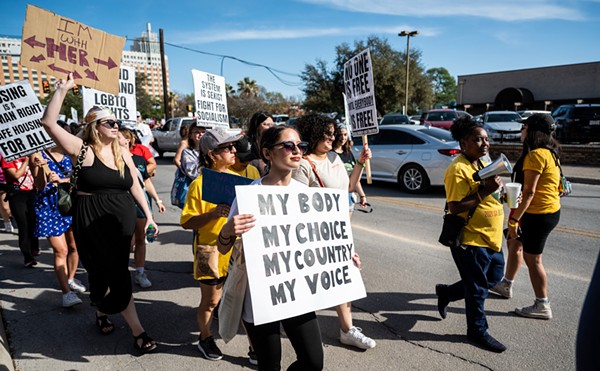Some Valentine's Day gifts are the worst.
Take Brief Jerky Edible Underwear, for instance. What part of Alabama is that popular in? Or there's Fundies, the underwear for two. And if anyone gives you a heart-shaped meat product, run for the hills.
But there are several Valentine's Day gifts that blow those crappy presents out of the water: sexually transmitted infections, or STI's (also called STDs).
"You know, Valentine's Day is an important day where couples are affectionate with one another and share their love with one another," Dr. Amil Mangla, San Antonio Metropolitan Health assistant director of health in communicable diseases, said. "It's a different decade and part of that are STDs. We've got to talk about it and if we don't talk about it, it's a downfall to the community."
In Texas, Bexar County has the third most cases of STI's in the state, preceded by Dallas and Harris counties, according to the Texas Department of State Health Services 2014 Texas STD Surveillance Report. That document exhaustingly tracks total cases and rates of chlamydia, gonorrhea and syphilis in Lone Star State counties and metropolises.
And Bexar County is ranked eighth in the state for syphilis case rates.
Three years ago, the county's syphilis, gonorrhea and chlamydia cases were piling up, Mangla explained. But more alarmingly, Bexar County was ranked number one for congenital syphilis, which happens when a mother passes the infection to her child. Congenital syphilis is frequently fatal and can cause blindness, seizures and severe learning disabilities.
"So we had a concern and started implementing a variety of programs," Mangla said. "A major program we implemented is Get Tested. Three years later, our congenital syphilis rates in San Antonio has dropped almost 80 to 85 percent."
In 2014, there were just 10 cases of congenital syphilis, down from 17 in 2013 and 18 in 2014. The 2013 rate of congenital syphilis was 8.1 times higher than the 2012 national average and 3.6 times higher than Texas' 2013 rate.
Syphilis cases decreased, too, by 15 percent. In 2013, the city was sounding alarm bells, saying San Antonio was experiencing a syphilis epidemic.
Mangla credits the successful decrease in syphilis cases to awareness and behavior change, like convincing couples that if they're going to have sex, men should use condoms.
"The concern is the amount of diseases out there. Condom use decreases diseases. Some individuals can be asyptomatic," he said. "Because if you get tested and you have syphilis, it's just a penicillin shot and you are cured and you're not spreading. So that's key."
With success in curbing San Antonio's syphilis epidemic, Mangla now has his sights set on educating the community about Human papillomavirus infection, commonly called HPV — the most common STI.
"This year I am promoting [HPV] as much as I can. HPV is very important because there's a key cancer preventative vaccine that has nothing to do with sexual activity," Mangla said. "You are almost 99 percent preventing cervical cancer in your daughter in the next 10 to 15 years. ... That's why we're really pushing for it."
Mangla and San Antonio Metropolitan Health aren't alone in the belief that promoting the HPV vaccine is critical, the Centers for Disease Control and Prevention has taken the lead by providing online resources and encouraging state programs, partner organizations and cancer leaders to promote adolescent vaccinations through strategic partnerships.
"A lot of oncologists are saying today that when they are getting patients coming in who say they hoped that 20 years ago they would have had this vaccine," Mangla said. "We don't see benefit now but we will see the benefit in the next 10 years when these kids grow up."
But the one common denominator in STI prevention, no matter if it's genital herpes, HPV, syphilis or AIDS, is getting tested and practicing safe sex.
"The main thing is education and awareness and if you empower people, they are going to understand not to do these unusual behaviors [unsafe sex] and the other one is get tested because if you get tested you can get treated right away and ... you are not spreading the disease," Mangla said.
While STIs might be the last topic on romantic minds this Valentine's Day, spreading an infection is the worst possible gift a lover could give.
"We need to know it is happening and face the facts," Mangla said. "Being educated [about sexual health] helps far more than being detrimental."
Get Tested
Metro Health STD/HIV Clinic
512 East Highland Blvd.
(210) 207-8830
sanantonio.gov/health/healthservices/stdservices.aspx
San Antonio AIDS Foundation
333 S. Hackberry St.
(210) 225-4715
sanantonioaids.org
Planned Parenthood
2140 Babcock Road, Suites 100, 200, 201
(210) 681-7800
plannedparenthood.org
Hotline Help
Herpes Hotline: 1 (800) 230-6039
Herpes support: (210) 736-2244
S.A. AIDS Foundation: (210) 225-4715
S.A. Friends: (210) 989-0104
AIDS Hotline: 1 (800) 342-AIDS
CDC National STD/HIV/AIDS Hotline:
1 800 CDC-INFO or (232-4636)




















